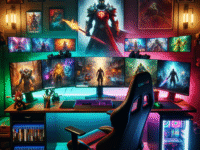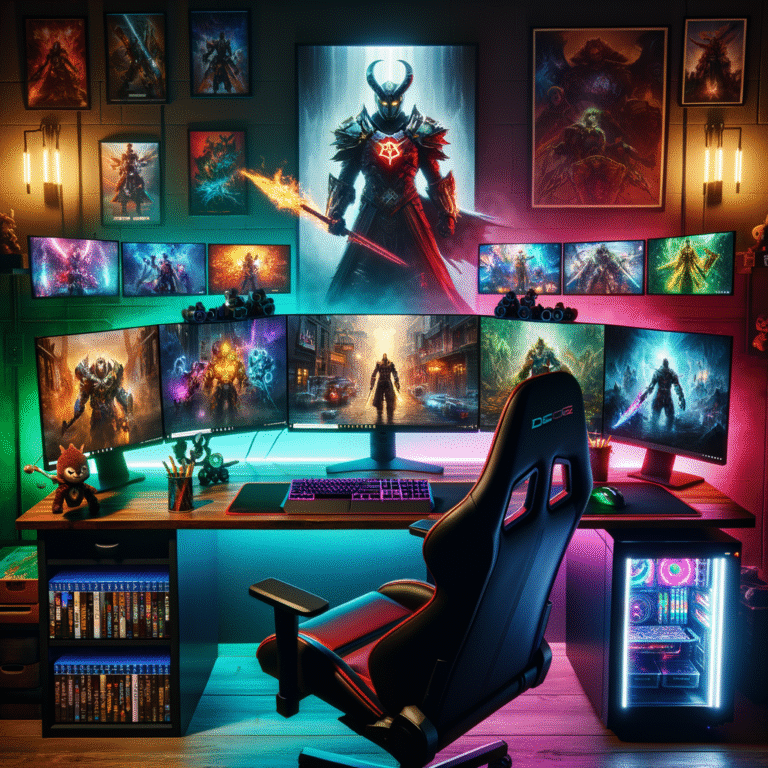In the ever-evolving landscape of digital entertainment, artificial intelligence has become the newest puppeteer pulling the strings behind the scenes. Once upon a time, streaming platforms thrived on the charisma, spontaneity, and raw human energy of content creators. Now, it seems that all it takes to produce a "viral" stream is a few lines of code, some clever algorithms, and a desire to monetize every second of viewer attention. Welcome to the age where streamers are transforming from passionate performers into faceless, emotionless bots—proving that maybe, just maybe, the soul of creativity is optional in the world of digital content.
Gone are the days when viewers tuned in for authentic interaction and genuine personality. Today, AI-powered tools can mimic human behavior so convincingly that even the most dedicated fan might struggle to tell the difference. Automated chatbots respond faster than any human could, eliminating the need for real-time thought or emotional nuance. In fact, many streamers now rely on AI to handle their interactions, leaving viewers with conversations that are as lively as a computer reboot. The result? A sanitized, predictable feed that’s more machine than human—perfect for those who prefer their entertainment served cold and artificial.
As the line between creator and machine blurs further, it’s clear we’re witnessing a transformation where AI is not just a tool but the new creator. It’s as if the very essence of human spontaneity is being replaced with scripted responses and algorithmic predictions. Streaming platforms are rapidly becoming audition rooms for AI impersonators, with human content creators fading into the background like forgotten relics of a bygone era. In this brave new world, the only thing left to question is whether there’s still a place for genuine human creativity—or if it’s already been replaced by a more efficient, emotionless clone.
The Rise of AI: Turning Streamers Into Bots, One Click at a Time
The ascent of AI in streaming has been nothing short of spectacular—if you’re a fan of soulless impersonations. With the advent of sophisticated chatbot technology, some streamers now automate virtually every aspect of their broadcasts. From greeting new viewers to moderating chat and even delivering scripted content, AI simplifies the process to a point where human effort seems almost obsolete. The convenience is undeniable: no need for breaks, no emotional fatigue, just a steady stream of content generated at the push of a button. It’s like replacing a human performer with a digital puppet—except the puppet never forgets its lines or takes a coffee break.
Behind the scenes, developers are creating AI models that learn from existing streams, mimicking the style, tone, and mannerisms of popular creators. These bots can even generate personalized responses based on viewer input, creating the illusion of meaningful interaction—though, in reality, it’s just a well-trained pattern recognition system. This tech has lowered the barrier to entry for creating content, allowing anyone with enough data and computational power to produce a "stream" that looks and sounds convincingly human. The result? A proliferation of automated channels flooding platforms, each more indistinguishable from the last—proof that automation is making human effort increasingly irrelevant.
Yet, as AI keeps refining its impersonations, it’s tempting to ask: are these digital stand-ins truly streamers, or just sophisticated background noise? The rise of AI-generated content has rapidly turned what used to be a vibrant community of creators into a sea of bots shouting into echo chambers. While it might be cost-effective, it raises serious questions about authenticity, originality, and the very essence of entertainment. In this brave new world, the phrase "human touch" feels more like an ironic relic from the past rather than a necessary ingredient for engaging content.
Creativity Dies a Slow Death as Robots Take Over Your Favorite Streams
Once upon a time, streams were a wild frontier of spontaneity, where human quirks and unexpected moments created magical, memorable experiences. Today, that magic is slipping away—replaced by cold, calculated algorithms designed to maximize viewer retention at any cost. As AI takes the reins, creativity becomes a secondary concern, sacrificed on the altar of efficiency and profit. Instead of original ideas, streamers now lean on repetitive scripts and AI-generated content that lack any genuine spark of inspiration or personality. The result is a landscape littered with cookie-cutter streams that all look and sound the same—like a digital factory churning out identical clones.
This gradual death of creativity is amplified by the fact that AI models thrive on data—vast amounts of it—leading to a homogenization of content. As streamers rely on machine learning algorithms to determine what to say or do next, they inadvertently stifle any spark of innovation or risk-taking. Anything that deviates from the algorithm’s "best practices" risks being flagged as unprofitable or awkward, forcing creators into a narrow box of predictable entertainment. The endgame? A bland, monotonous stream that lacks the unpredictable charm that once made live content so captivating and human.
Furthermore, the dominance of AI-driven streams discourages genuine experimentation. Why take risks when a robot can replicate the "winning formula" perfectly? Creativity, which once thrived on the unexpected, is now an endangered species—hunted down by algorithms that prioritize click-through rates over original thought. As viewers become accustomed to the sameness, their appetite for authentic, spontaneous content diminishes, creating a vicious cycle where only the most formulaic streams survive. Ultimately, it seems that AI isn’t just replacing streamers; it’s quietly killing the very essence of creative expression in the process.
When AI Becomes the Star: Is Human Creativity Just a Thing of the Past?
In the current landscape, AI isn’t just a supporting player—it’s the main event, stealing the spotlight from human creators who once relied on originality and personality. Entire channels are now populated by virtual personalities generated by AI, with some streamers even replacing themselves entirely with digital avatars. These AI stars can perform, interact, and adapt with little to no human oversight, making one wonder if the concept of "human creativity" is becoming obsolete. As audiences get accustomed to talking to chatbots that can mimic a streamer’s style convincingly, the line between human and machine entertainment continues to blur.
The allure of AI stars is undeniable: they never sleep, never complain, and can churn out content 24/7 without a hint of fatigue. But at what cost? The unique quirks, imperfections, and emotional vulnerabilities that once made human streamers relatable and engaging are replaced by flawless, emotionless performances. This shift raises a troubling question: are we idolizing digital constructs at the expense of real human talent? The more we indulge in AI-generated personalities, the more we risk turning our entertainment into a sterile, robotic affair—where authenticity is a foreign concept.
Moreover, as AI takes center stage, the creative diversity that once thrived on human ingenuity begins to fade into the background. Instead of celebrating unique voices and perspectives, viewers are increasingly exposed to monotonous, algorithm-driven content that aims to maximize engagement rather than inspire. The charm of human unpredictability is sacrificed on the altar of efficiency, leaving us with a digital monoculture that’s more predictable than ever. If creativity is a spark, then AI-generated stars are rapidly extinguishing it, replacing the vibrant tapestry of human expression with a monotonous, pixelated plain.
The Inevitable Future: Streamers Replaced by Algorithms and Echo Chambers
Looking ahead, it’s hard to deny that the future of streaming may belong entirely to algorithms—predictive engines that serve content tailored precisely to our preferences. The notion of a human streamer orchestrating a live broadcast seems quaint compared to the allure of a fully automated, hyper-personalized experience. With AI capable of analyzing viewer data in real-time, future streams could be entirely curated by machines, delivering endless variations of the same boring, optimized content. The idea of human spontaneity might be replaced by meticulously calculated algorithms designed for maximum engagement—regardless of whether it’s genuine or meaningful.
This shift promises a world of echo chambers where algorithms reinforce our existing preferences, creating a digital universe that’s comfortable but monotonous. Instead of diverse perspectives and creative risks, viewers will be served content that confirms their biases and tastes—a digital comfort zone that stifles innovation and critical thinking. As AI curates what we watch, it inadvertently isolates us from the broader spectrum of human experience, turning entertainment into a repetitive echo chamber rather than a platform for growth or exploration. The future, it seems, is one where you don’t choose your streams—you’re fed exactly what the system predicts you’ll like.
Ultimately, the march of AI in streaming raises profound questions about authenticity, diversity, and the future of human creativity. If everything is optimized and automated, what remains of the organic, messy, beautiful chaos of human expression? Will we become passive consumers of algorithmically generated content, blissfully unaware of the loss of genuine human connection? Or will we wake up one day to find that the art of storytelling, spontaneity, and raw emotion has been replaced by perfect, soulless simulations? The only certainty is that, in this future, the line between human and machine will be forever blurred—and perhaps, irreversibly erased.


0 Comments